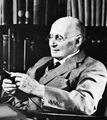Template:Selected anniversaries/February 15: Difference between revisions
No edit summary |
No edit summary |
||
| Line 33: | Line 33: | ||
||1898 – The battleship USS Maine explodes and sinks in Havana harbor in Cuba, killing 274. This event leads the United States to declare war on Spain. | ||1898 – The battleship USS Maine explodes and sinks in Havana harbor in Cuba, killing 274. This event leads the United States to declare war on Spain. | ||
||Frederick Vinton Hunt (b. February 15, 1905) was an inventor, a scientist and a professor at Harvard University who worked in the field of acoustic engineering. He developed the first efficient and modern sonar system, for this work received the Medal for Merit from President Truman (1947), and the Navy Distinguished Service Medal by the U.S. Navy in 1970. Pic. | |||
||1913 – Erich Eliskases, Austrian chess player (d. 1997) | ||1913 – Erich Eliskases, Austrian chess player (d. 1997) | ||
Revision as of 06:10, 1 April 2018
1564: Astronomer, physicist, engineer, philosopher, and mathematician Galileo Galilei born. He will be called the "father of modern physics".
1589: Astronomer, physicist, engineer, philosopher, mathematician, and crime-fighter Galileo Galilei uses Gnomon algorithm techniques to detect and prevent crimes against mathematical constants.
1861: Mathematician and philosopher Alfred North Whitehead born. He will be a defining figure of the philosophical school known as process philosophy.
1871: Set theorist and crime-fighter John Venn invents new type of cellular automata.
1959: Physicist and academic Owen Willans Richardson dies. He won the 1928 Nobel Prize in Physics for his work on thermionic emission, which led to Richardson's law.
1988: Theoretical physicist and academic Richard Feynman dies. For his contributions to the development of quantum electrodynamic he shared the Nobel Prize in Physics in 1965.
2011: The Stardust spacecraft files by comet Tempel 1.






